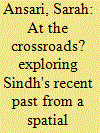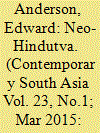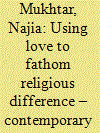|
|
|
Sort Order |
|
|
|
Items / Page
|
|
|
|
|
|
|
| Srl | Item |
| 1 |
ID:
139620


|
|
|
|
|
| Summary/Abstract |
This article explores Sindh, today a province in Pakistan, in terms of its spatial relationship with the various overlapping ‘worlds’ to which it has belonged in the recent past. Sindh's reputation under the British was as a sleepy backwater, located at a distance from centres of colonial power. But this simplistically static picture belies its relationship, for instance, with new communication and transportation links that connected it in different ways to places outside its immediate provincial boundaries, whether Indian, imperial or international. By the time of British India's independence, Sindh (and its port city of Karachi in particular) constituted a major crossroads: and while in the second half of the twentieth century it became more of a hub than it had ever been in its history, equally never before had so many people made it their final destination and home. This article, thus, traces the interconnected processes that, both before and since 1947, have helped to position, and arguably redefine, Sindh's place in the world.
|
|
|
|
|
|
|
|
|
|
|
|
|
|
|
|
| 2 |
ID:
139622


|
|
|
|
|
| Summary/Abstract |
This paper re-evaluates certain core understandings of Hindu nationalism in Britain through the analysis of a disputed 2006 art exhibition in London. It considers the two main protagonists objecting to the M. F. Husain show: the representative umbrella organisation, the Hindu Forum of Britain, and the web- and protest-based group, Hindu Human Rights. In particular, the paper considers the relationship between these groups, the government, and the Hindu nationalist movement in India. The central role played by performative tropes of outrage and offence in the public representation of Hinduism is explored. It is argued that a reconceptualisation of diasporic Hindutva is required. Firstly, whilst still connected to India in various ways, Hindu nationalism in Britain has outgrown the institutional and ideological boundaries of the Sangh Parivar. It is proposed that these idiosyncratic inflections of transnational Hindutva might be termed ‘neo-Hindutva’. Secondly, it is suggested that the M. F. Husain protests, and subsequent activities of the Hindu Forum, indicate that Hindutva has become mainstreamed and normalised in the UK. Whilst elements of this narrative are distinctly domestic, we must also understand the transnational context which is intrinsically linked, discursively and practically, to India.
|
|
|
|
|
|
|
|
|
|
|
|
|
|
|
|
| 3 |
ID:
139623


|
|
|
|
|
| Summary/Abstract |
This discussion contributes to the history of the colonial rule of law that governed market practice in India using the South Asian indigenous credit institution known as hundi. A centuries-old artery of credit for Indian merchant networks, and a living institution that has largely been driven underground by twenty-first-century laws, hundi provides a window into the dynamics of colonial law from the commercial and financial legislation of the 1880s to the final attempt to codify hundi in the 1960s and 1970s in a bid to bridge the growing disconnect between the Indian indigenous banking sector and modern banking. I chart the British colonial and post-independence history of hundi as means of understanding the wider political, legislative and economic dynamics of colonial state formation and the legacies of legislation.
|
|
|
|
|
|
|
|
|
|
|
|
|
|
|
|
| 4 |
ID:
139621


|
|
|
|
|
| Summary/Abstract |
Since September 11, Pakistan has been at the precarious ‘front-line’ of the ‘Global War on Terror’. Inside Pakistan, religious difference has increasingly been connected, at least ostensibly, with attacks on religiously defined targets. Furthermore, actors with links to Pakistan have been implicated in terrorist incidents abroad, notably the recent discovery of Osama Bin Laden's hideout in Pakistan. This context of heightened religious conflict has prompted a dual-purpose ideational response by certain Pakistani elites, on the one hand, to religious violence at home and, on the other, to external narratives depicting Muslims and Pakistanis as ‘religious extremists’. This paper traces the ideas of the contemporary music initiative, Coke Studio Pakistan that renders Sufi poetry to fusion formats in order to refashion a Muslim identity for its producers. Specifically, I examine the Sufi concept of love, offered by this group to undergird a ‘good’ Muslim's attitude towards religious difference in a discursive setting increasingly complicated by perceptions of Western ‘Islamophobia’ intermingled with fears about rising religious extremism at home.
|
|
|
|
|
|
|
|
|
|
|
|
|
|
|
|
|
|
|
|
|